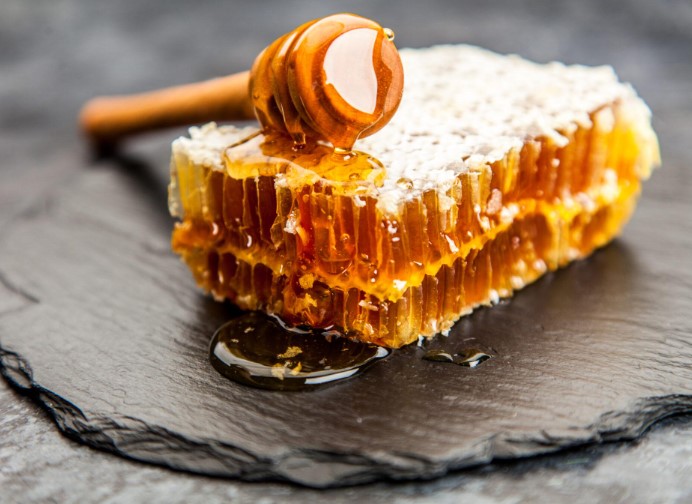Can cats eat honey? Is honey toxic to cats?
Can cats eat honey? When it comes to pampering our feline friends, pet owners often wonder about the safety of various human foods for cats. Honey, a natural sweetener known for its health benefits in humans, frequently comes into question. Here’s a detailed look into whether cats can eat honey, considering various health and nutritional aspects. Follow Cat Memorial Stones !!
What is Honey?
Honey is a thick, sweet liquid produced by bees from the nectar of flowers. It’s packed with natural sugars (fructose and glucose), antioxidants, vitamins, and minerals. For humans, honey can offer various health benefits, such as soothing sore throats, promoting skin health, and acting as a natural energy source. However, what’s beneficial for humans isn’t always beneficial for pets.

Can cats eat honey? Can Cats Digest Honey?
Cats are obligate carnivores, meaning their digestive systems are designed primarily to process meat. Unlike humans or even dogs, cats lack certain enzymes necessary to properly break down carbohydrates and sugars, such as those found in honey. This can lead to digestive discomfort, including:
- Upset stomach
- Vomiting
- Diarrhea
- Bloating
Given this, honey is not an ideal food for cats. While a small lick of honey is unlikely to cause harm, regularly feeding honey to your cat could result in gastrointestinal issues.
Is honey toxic to cats? Can honey kill cats?
While honey may offer health benefits to humans, those same benefits do not apply to cats. Here’s why:
- Cats Can’t Taste Sweetness
Unlike humans, cats lack taste receptors for sweetness. So even though honey is sweet and appealing to us, your cat won’t find the same satisfaction in its taste.
- Honey is High in Sugar
Honey is mostly sugar, and cats don’t require sugar in their diets. Too much sugar can lead to obesity and even diabetes in cats, especially if consumed frequently.
- Risk of Botulism
Honey, especially raw honey, can contain bacteria that could lead to botulism. While adult cats are generally more resistant to this, kittens, elderly, or immunocompromised cats are more susceptible. Botulism is a serious condition that can cause paralysis and even be fatal.

>>> Click Can cats eat hummus? What Happens If a Cat Eats Hummus?
Benefits of honey for cats
Is honey good for sick cats? In certain rare cases, a small amount of honey could potentially offer some benefits, but only under the guidance of a veterinarian. For instance:
- Sore Throat or Cough
Can cats have honey for a cough? If your cat has a mild cough or throat irritation, a vet may recommend a tiny dab of honey to help soothe their throat. However, this is not a common treatment and should only be done with veterinary approval.
- Energy Boost for Weak Cats
In extreme cases of malnutrition or hypoglycemia, honey might be used as a short-term solution to provide an energy boost. Again, this should only be done after consulting with a vet.
How Much Honey is Safe for Cats?
If you’re tempted to give your cat a little honey, keep it to an absolute minimum. A tiny lick (about 1/4 teaspoon or less) is unlikely to harm an adult, healthy cat. However, it’s important to observe your pet afterward for any signs of discomfort or digestive upset.

Alternative Treats for Cats
If you’re looking for a safe and nutritious treat for your cat, consider options that are more suitable for their carnivorous diet, such as:
- Cooked chicken or turkey
Cats love meat, and small amounts of cooked, unseasoned poultry can be a great treat. - Catnip or Cat Grass
Some cats enjoy nibbling on cat-safe herbs and grass, which can be both stimulating and good for digestion. - Commercial Cat Treats
There are plenty of specially formulated cat treats available that cater to their nutritional needs while satisfying their cravings.
Conclusion: Should You Give Your Cat Honey?
While honey is not toxic to cats, it doesn’t offer them any real benefits and may cause digestive issues or more severe health concerns like obesity or botulism. Therefore, it’s best to avoid giving honey to your feline friend. If you have any doubts about your cat’s diet or want to introduce a new food, always consult with your veterinarian first.
Frequently Asked Questions
- Can kittens eat honey?
No, kittens should never be given honey. They are more vulnerable to the risks of botulism and are more sensitive to sugar, which can cause digestive issues.
- Can honey treat a cat’s sore throat?
While honey can sometimes soothe a sore throat in humans, there’s no significant evidence it does the same for cats. If your cat has a sore throat or a cough, consult a vet for appropriate treatment.
- What happens if my cat licks honey by accident?
A small amount of honey is unlikely to cause any immediate harm. However, monitor your cat for any signs of an upset stomach, such as vomiting or diarrhea.
- Is manuka honey safe for cats to eat?
Yes, manuka honey is generally safe for cats to eat in small quantities. It can be beneficial for wound healing due to its antibacterial properties.
- Can cats drink honey water?
No, it’s generally not recommended for cats to drink honey water.
- Can cats eat honey yogurt?
No, cats should not eat honey yogurt.
Here’s why:
- Honey: While honey is generally safe for humans, it’s high in sugar and can cause digestive problems for cats.
- Yogurt: While plain yogurt can be a good source of probiotics for cats, flavored yogurts, especially those with honey, can be harmful due to the high sugar content.
If you want to offer your cat a probiotic-rich treat, consider using a cat-specific probiotic supplement or a plain, unsweetened yogurt. Always consult with your veterinarian before making significant changes to your cat’s diet.
- Can cats have honey nut cheerios?
No, cats should not have honey nut Cheerios.
Here’s why:
-
- Sugar content: Cheerios, especially honey nut Cheerios, are high in sugar, which can lead to weight gain, dental problems, and other health issues in cats.
- Choking hazard: Cheerios are small and can pose a choking hazard for cats.
- Digestive problems: Cats’ digestive systems are sensitive, and Cheerios can cause upset stomachs, diarrhea, or vomiting.
>>> Read: Can cats eat garlic?
